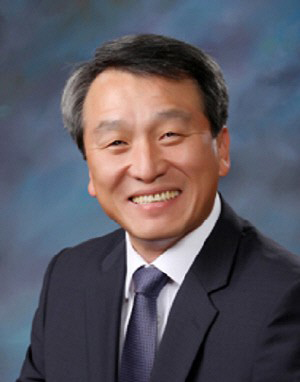
IIAC President Jung Chang-soo
Incheon International Airport Corp. (IIAC) President Jung Chang-soo said the ongoing third-phase project of expanding Incheon International Airport is focusing on strategies to go eco-friendly and energy self-sufficient on top of convergence with state-of-the-art technology. Jung made the remark at an interview to mark his two months in office on Oct. 4.
The new IIAC president said, “The third-phase project is progressing well without a hitch, and the project, which started off this year, is pushed with a focus on going eco-friendly and energy self-sufficient on top of the convergence of advanced technologies.”
“If it is finished in 2017, Incheon International Airport will become a leading global airport fitted with ‘smart airport,’ ‘green airport’ and ‘eco-airport’ functions,” Jung said. He continued that Incheon International Airport will ascend a level upward to rank second and ninth in terms of freight handling, boosting its capacity from 4.5 million tons to 5.8 million tons, and passenger capacity from 44 million passengers to 62 million annually, respectively, by 2017.
The IIAC has succeeded in being awarded the preferred bidder status for a project to build and operate the second Yangon Airport in Myanmar recently. The IIAC won a $1.1 billion order, outbidding 29 consortiums from 15 countries. This is the first time Korea has been selected as the preferred bidder for the construction of an airport abroad.
If the IIAC strikes a final deal by the end of this year, the corporation said it will be charged with building a new airport in the Bago area, 60 km north of Yangon, the capital of the Southeast Asian country, by 2018. The project will take a Build-Operate-Transfer format in which the IIAC will be allowed to recoup its investments by earning the proceeds from the operation of the new airport for 50 years. The Myanmar government is hurrying up the construction of a new airport with a capacity of handling 12 million passengers per year to substitute for Yangon International Airport. The IIAC is participating in the project along with Kumho E&C, Halla E&C, Lotte E&C, and POSCO ICT.
As to breaking the mold for innovating the corporate culture of the IIAC, Jung said his corporation plans to build a new corporate culture in which an overall cooperative system will be in place by removing each department’s partitions and placing employees into new positions on a rotational basis and facilitating collaboration with organizations residing at the airport, as well as central and provincial government bodies.
The new IIAC president noted that he promoted an executive from the corporation’s occupational ladder to IIAC vice president in consideration of his expertise, departing from the conventional appointment of a ranking former government official. He stressed that the corporation can have a competitive edge with personnel with expertise on top of simplified decision-making, management efficiency, and ethical management strengthened with the introduction of the principle “one strike, you’re out, no second chance.”
Jung touched on a plan to make the Incheon International Airport area a multi-purpose resort combining a casino for foreigners, cultural and convention facilities, and other amenities. He said he will not rest on the IIAC’s laurels of winning the global best service airport award for the eighth straight year, adding that the IIAC will devote itself to becoming a global standard airport in overall airport operation categories, including safety, security, and finances, in order to solidify the global number one position.
A graduate of Seoul High School and Sungkyunkwan University Public Administration Department, Jung began his official career after passing the 23rd higher administration test. He has held such prominent positions as presidential secretary in charge of construction and transport, director-general in charge of housing and city at the Ministry of Land, Infrastructure and Transport (MLTM), assistance minister of planning and coordination, and first vice minister of the MLTM. He took office as the fifth president of the IIAC on Aug. 4.
_인천공항여객터미널.jpg)
